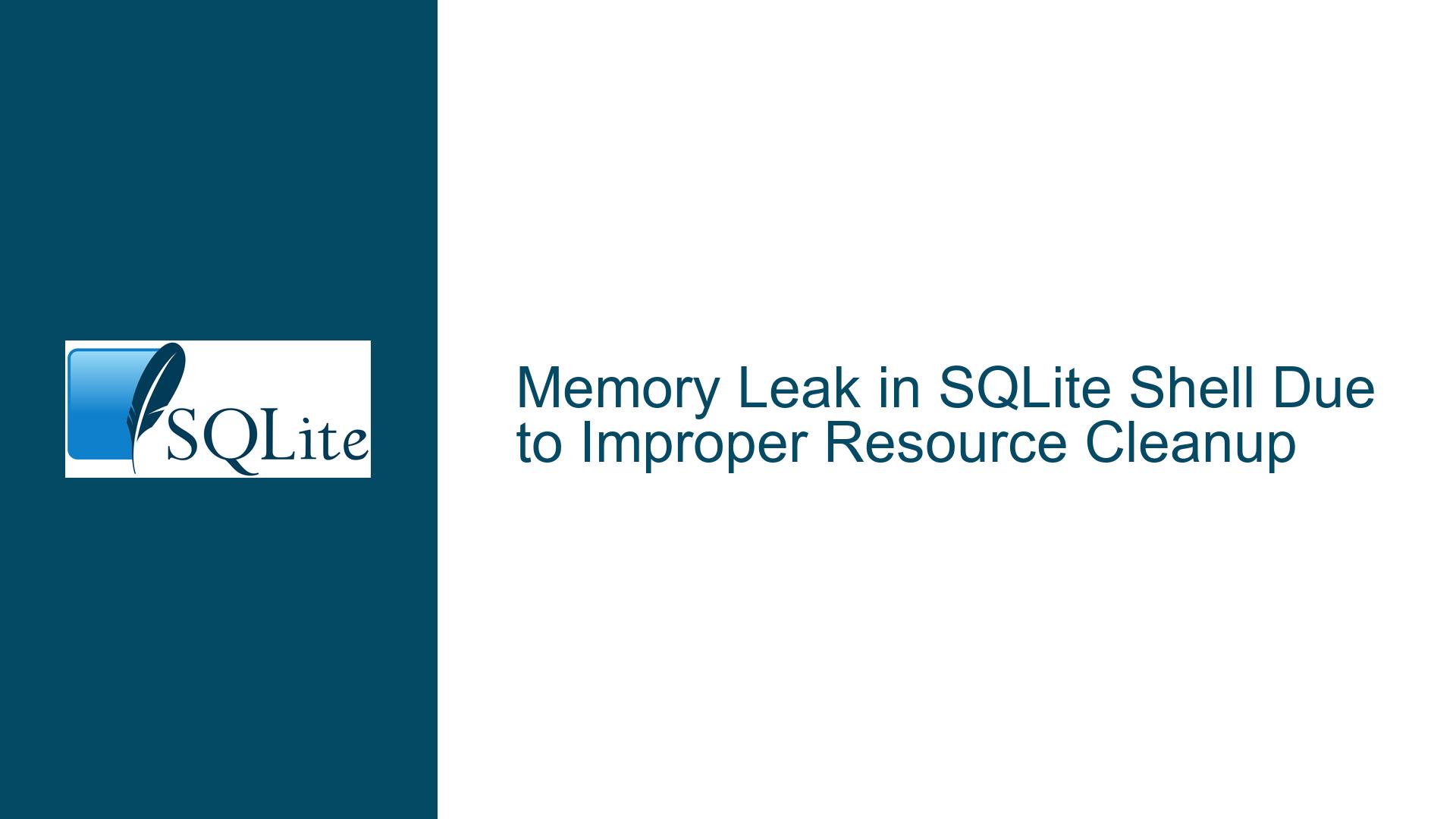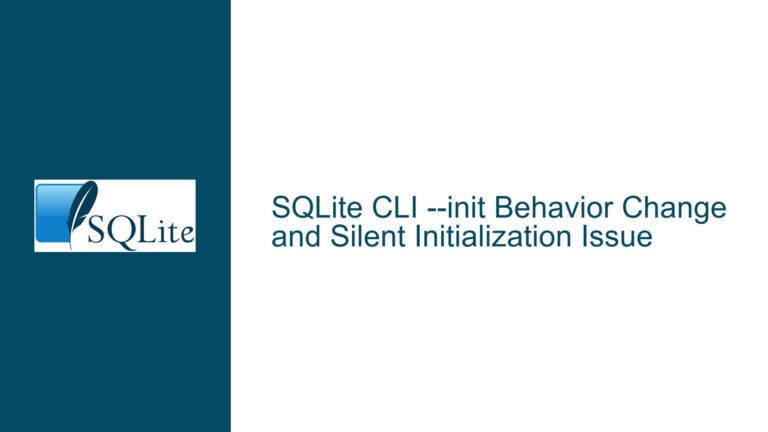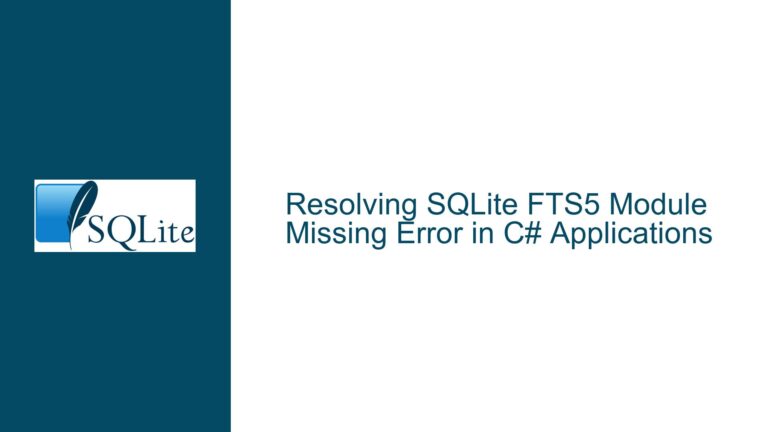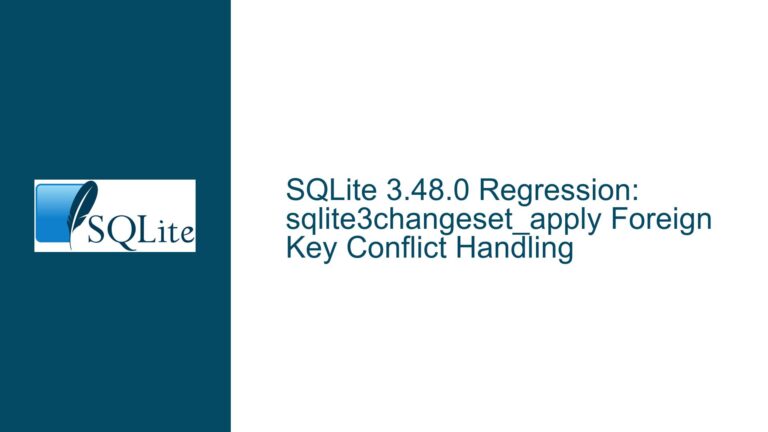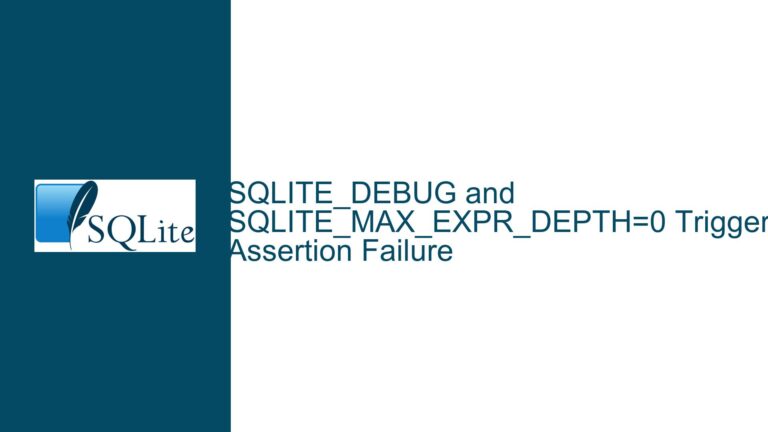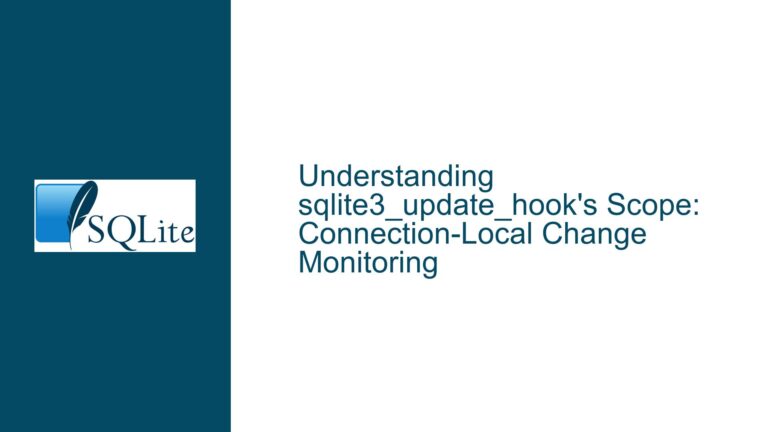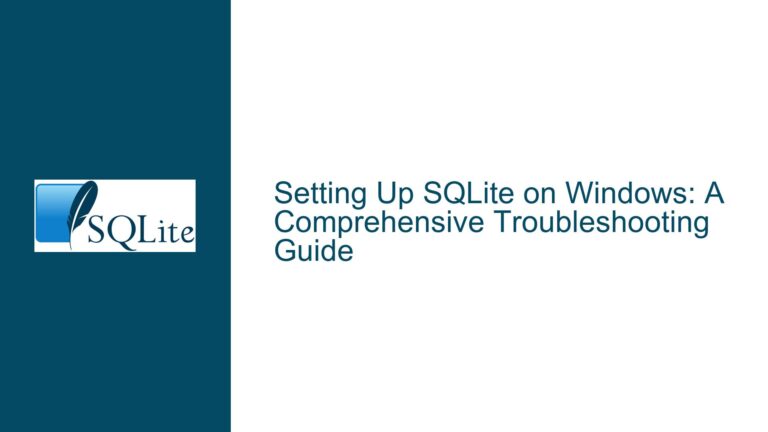Memory Leak in SQLite Shell Due to Improper Resource Cleanup
Memory Leak in SQLite Shell During .import Command Error Handling
The SQLite shell (sqlite3.exe or equivalent on other platforms) exhibits a memory leak when processing certain inputs during the execution of the .import command. This issue arises specifically when the .import command encounters an error and exits prematurely, failing to free memory allocated to the sCtx structure. The sCtx structure is a context object used internally by the SQLite shell to manage state during the .import operation. The memory leak occurs because the sCtx.z field, which holds dynamically allocated memory, is not freed before the error-handling code jumps to the meta_command_exit label.
The leak can be reproduced with the following input:
.i |junk (Not(SQL
.q
When this input is provided, the .import command handler encounters an error and exits without freeing the memory allocated to sCtx.z. This results in a memory leak that persists until the process terminates. The issue has been observed in SQLite version 3.32.1 and earlier versions.
The problem is not limited to a single exit path. Multiple goto meta_command_exit statements within the .import command handler fail to free sCtx.z, leading to memory leaks in various error scenarios. Additionally, the fix for this issue introduces a compiler warning due to a syntactical anomaly in the code, specifically a triple & (&&&) operator, which is likely a typographical error.
Improper Resource Cleanup in Error Handling Paths
The root cause of the memory leak lies in the error-handling logic of the .import command handler. When an error occurs, the handler attempts to clean up resources by closing open file handles, finalizing prepared statements, and printing error messages. However, it neglects to free the memory allocated to sCtx.z, a dynamically allocated string used during the import process.
The sCtx structure is defined as follows:
struct sCtx {
FILE *in; // Input file handle
char *z; // Dynamically allocated string
// Other fields omitted for brevity
};
The sCtx.z field is allocated memory using sqlite3_malloc() or a similar function during the .import command execution. When an error occurs, the handler must ensure that this memory is freed to prevent leaks. However, the current implementation fails to do so in several error-handling paths.
The issue is exacerbated by the use of the goto meta_command_exit statement, which is a common pattern in the SQLite shell for handling errors. While this pattern simplifies error handling by centralizing cleanup code, it also increases the risk of resource leaks if not all necessary cleanup steps are included in the target block.
The memory leak can be demonstrated by adding a call to sqlite3_free(sCtx.z) before the goto meta_command_exit statement. This addition resolves the leak, confirming that the issue is caused by improper resource cleanup.
Fixing the Memory Leak and Addressing Compiler Warnings
To resolve the memory leak, the .import command handler must ensure that sCtx.z is freed in all error-handling paths. This involves adding a call to sqlite3_free(sCtx.z) before every goto meta_command_exit statement within the handler. The following code snippet demonstrates the necessary change:
sqlite3_free(zSql);
if( rc ){
if (pStmt) sqlite3_finalize(pStmt);
utf8_printf(stderr,"Error: %s\n", sqlite3_errmsg(p->db));
xCloser(sCtx.in);
sqlite3_free(sCtx.z); // Free sCtx.z to prevent memory leak
rc = 1;
goto meta_command_exit;
}
nCol = sqlite3_column_count(pStmt);
This change ensures that sCtx.z is freed whenever an error occurs, preventing the memory leak.
However, applying this fix introduces a compiler warning due to a syntactical anomaly in the code. The warning is triggered by the following line:
if( p->in!=0 &&& p->xCloser!=0 ){
The triple & (&&&) operator is likely a typographical error. The intended logic is a double && (logical AND) operator. The correct line should read:
if( p->in!=0 && p->xCloser!=0 ){
This correction eliminates the compiler warning and ensures that the code behaves as intended.
To summarize, the memory leak in the SQLite shell can be fixed by ensuring that sCtx.z is freed in all error-handling paths. This involves adding a call to sqlite3_free(sCtx.z) before every goto meta_command_exit statement within the .import command handler. Additionally, the typographical error involving the triple & operator should be corrected to eliminate the compiler warning.
Detailed Analysis of the Fix
The fix for the memory leak involves modifying the error-handling logic of the .import command handler to ensure that sCtx.z is freed before jumping to the meta_command_exit label. This change is necessary because sCtx.z holds dynamically allocated memory that must be explicitly freed to prevent leaks.
The following table summarizes the changes required to fix the memory leak:
| File | Line Range | Change Description |
|---|---|---|
shell.c | 8011-8136 | Add sqlite3_free(sCtx.z) before every goto meta_command_exit statement |
shell.c | 13450 | Replace &&& with && to eliminate the compiler warning |
These changes ensure that sCtx.z is freed in all error-handling paths, preventing the memory leak. The correction of the typographical error involving the triple & operator eliminates the compiler warning, ensuring that the code compiles cleanly.
Impact of the Fix
The fix has several important implications for the SQLite shell:
Memory Leak Prevention: The primary benefit of the fix is the prevention of memory leaks during the execution of the
.importcommand. This improves the reliability and stability of the SQLite shell, particularly in scenarios where errors occur during the import process.Code Maintainability: By ensuring that all dynamically allocated memory is properly freed, the fix improves the maintainability of the code. Future developers working on the
.importcommand handler will have a clearer understanding of the resource management requirements.Compiler Warnings: The correction of the typographical error involving the triple
&operator eliminates a compiler warning, ensuring that the code compiles cleanly. This reduces noise in the build process and makes it easier to identify genuine issues.Backward Compatibility: The fix is backward compatible with existing SQLite installations. It does not introduce any new dependencies or require changes to existing databases or applications.
Best Practices for Resource Management in SQLite Shell
The memory leak in the .import command handler highlights the importance of proper resource management in the SQLite shell. The following best practices can help prevent similar issues in the future:
Consistent Resource Cleanup: Ensure that all dynamically allocated resources are freed in all code paths, including error-handling paths. This can be achieved by centralizing cleanup code and using
gotostatements to jump to a common cleanup block.Code Reviews: Conduct thorough code reviews to identify potential resource leaks and other issues. Peer reviews can help catch errors that may be overlooked by the original author.
Static Analysis Tools: Use static analysis tools to identify potential memory leaks, resource leaks, and other issues. These tools can help catch problems early in the development process.
Compiler Warnings: Pay attention to compiler warnings and address them promptly. Warnings can indicate potential issues in the code that may lead to bugs or undefined behavior.
Testing: Test the SQLite shell thoroughly, including error-handling paths, to ensure that all resources are properly managed. Automated tests can help catch issues that may not be apparent during manual testing.
By following these best practices, developers can reduce the risk of memory leaks and other resource management issues in the SQLite shell and other software projects.
Conclusion
The memory leak in the SQLite shell during the execution of the .import command is caused by improper resource cleanup in error-handling paths. The issue can be resolved by ensuring that sCtx.z is freed before every goto meta_command_exit statement within the .import command handler. Additionally, a typographical error involving the triple & operator should be corrected to eliminate a compiler warning.
The fix improves the reliability and maintainability of the SQLite shell, preventing memory leaks and ensuring that the code compiles cleanly. By following best practices for resource management, developers can reduce the risk of similar issues in the future and improve the overall quality of their software.
